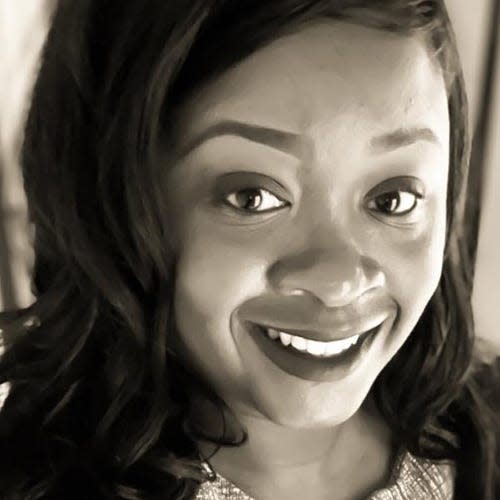Guest column: Americans' mythologized version of King paints false narrative
- Oops!Something went wrong.Please try again later.
Every January, Americans trot out a mythologized version of the Rev. Martin Luther King Jr. Overwhelmingly, the sound bites center a passive King and his improvised "I Have a Dream" speech, which he delivered on a pleasant summer day in August 1963 in the nation's capital.
As the narrative goes, King insisted on color blindness, calling for Americans to judge one another not "by the color of their skin" but by "the content of their character." In this account, King pushed for Americans to transcend race and imagine racial inequities as problems of the past.
One of the chief problems with this portrayal of King is that it is not real. This story also makes it impossible to grasp why the dedicated civil rights activist was arrested nearly 30 times in his life, assaulted on four occasions and died a violent death on April 4, 1968. It also does not explain why many people in King's lifetime despised him or why many conservatives today distort his legacy to try to silence history lessons about the lack of freedoms many Americans experience.
To realize King's dream, I believe we must move beyond a narrow focus on his 1963 mountain-top experience and see the dedicated activist who experienced many weary moments and sought to take lessons from them. Contending with King's dream requires us to look at his longer, more deliberate work, like the last book he wrote, titled: "Where Do We Go from Here?: Chaos or Community?"
To complete this 1967 publication, King isolated himself in Jamaica for two months. There, he reflected on what the civil rights movement had accomplished. At the time of his writing, the movement could boast many victories. In 1964, President Lyndon B. Johnson signed the Civil Rights Act prohibiting segregation in public places and banning employment discrimination based on race and sex. The 1965 Voting Rights Act outlawed discriminatory voting practices and permitted many Black southerners to express their political voices for the first time.
King acknowledged these successes but admitted that there was still work to do. Not only were there significant gaps between legislation and enforcement, but poor Black urban dwellers who were left out of these successes rioted in response to joblessness, municipal abandonment and invisibility. King was also deeply moved by the assassinations of civil rights activists who were murdered in cold blood with alarming regularity.
King discussed these troubles and highlighted their historical roots. He reminded readers that the history of American injustice was long, starting with the experiences of Indigenous peoples. He surmised that "the scar of racial hatred had already disfigured colonial society" even before enslaved Africans arrived.
King spent the early part of 1967 ― about four years after his "I Have a Dream" speech ― pondering how to correct American "disfigurement."
In the final chapter of "Where Do We Go from Here?," he fully lays out his dream. It is the "Beloved Community," a society based on justice, equal opportunity and love. In this society, racism, militarism and poverty at home and worldwide cease to exist.
King knew that Americans would not get there by accident. Instead, he argues that they would have to choose between "Chaos or Community," the subtitle of his book. As he explains, chaos is the opposite of community. Rather than benefiting from the commonality of humanity, citizens who live in chaos are marred by separation, distrust, violence and oppression.
Appreciating King's legacy means wrestling with how far we have and have not moved toward the Beloved Community. It means moving beyond a narrow King frozen in time and minimized to one speech and rejecting a mythologized version of his message. In his last book and other published works across his lifetime, King incessantly called for an honest reckoning with racism and related issues of discrimination in American history and society.

If we genuinely want to realize King's dream, we must reject myths about him and the nation, fight for the oppressed and call for "a genuine revolution in values." Only then will we conquer chaos.
Brandy Thomas Wells is an assistant professor of history at Oklahoma State University. Her research interests focus on civil and human rights activism, citizenship diplomacy and U.S. foreign policy. Her essays have appeared in outlets like the Journal of African American History, Women and Social Movements in Modern Empire, and edited collections, including Ideology in U.S Foreign Relations (Columbia University, 2022). She is writing her first book, which examines the global activism of Black women’s civic organizations in the 20th century.
This article originally appeared on Oklahoman: Guest: Americans' mythologized version of King paints false narrative
